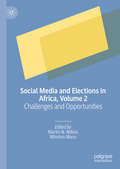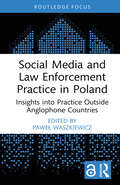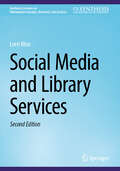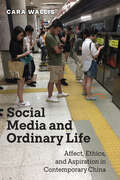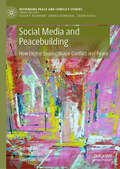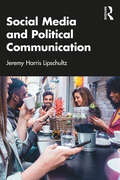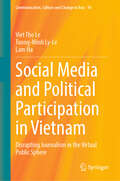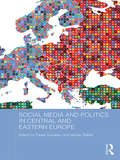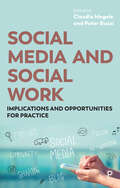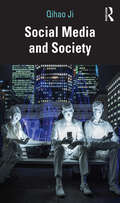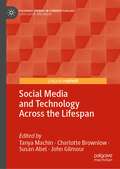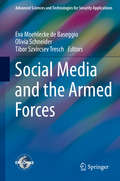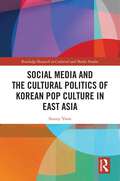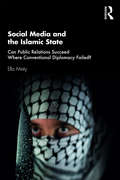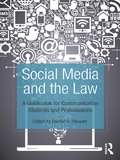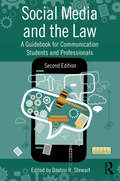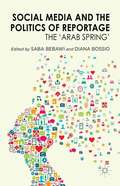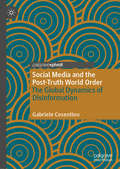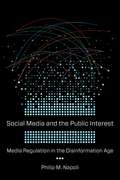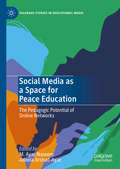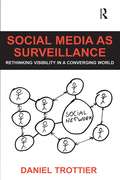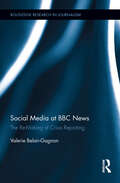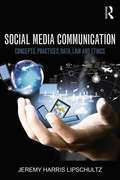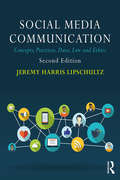- Table View
- List View
Social Media and Elections in Africa, Volume 2: Challenges and Opportunities
by Winston Mano Martin N. NdlelaThis book, the second of two volumes, explores the challenges and opportunities presented by the increased presence of social media within African politics. Electoral processes in Africa have assumed new dimensions due to the influence of social media. As social media permeates different aspects of elections, it is ostensibly creating new challenges and opportunities. Most evident are the challenges of hate speech, misogyny and incivility. This book considers the impact of digital media before, during, and after elections, as well as authorities' attempts to legislate and regulate the internet in response. Contributions to this volume analyse social media posts, transgressive images, newspaper articles, and include case studies of Algeria, Zimbabwe, Kenya, South Africa, Nigeria and Uganda. This results in the delivery of an original depiction of the use of social media in a variety of African contexts. This book will appeal to academics and students of media and communication studies, political studies, journalism, sociology, and African studies.
Social Media and Law Enforcement Practice in Poland: Insights into Practice Outside Anglophone Countries (Routledge Studies in Crime, Culture and Media)
by Paweł WaszkiewiczThis book explores the role of social media in the daily practice of Polish criminal justice and how social media is, in turn, reshaping this practice. Based on empirical research, it confronts common beliefs about how police officers, prosecutors, and judges use social media in their work. Readers will find answers to the following questions: Which social media platforms are popular among law enforcement officers in Poland? How do the police use social media to investigate and prosecute crimes? What are the strategies for using social media to communicate with the community? What strategies are most successful?The findings in this book challenge some popular beliefs and theories about social media in criminal justice. As the first book to explore the use of social media in criminal justice outside of English-speaking countries, this collection of academic research will be of interest to academics focusing on criminology, criminal justice, and policing and will be useful to police leaders and officers, police social media administrators, prosecutors, and judges, who may be inspired by the research to implement new successful and more effective practices.The Open Access version of this book, available at www.taylorfrancis.com, has been made available under a Creative Commons Attribution-NonCommercial (CC-BY-NC) 4.0 International license. The costs of the Open Access publication were covered by the University of Warsaw under the Excellence Initiative Research University Action I.2.4 Supporting Open Access Publications.
Social Media and Library Services (Synthesis Lectures on Information Concepts, Retrieval, and Services)
by Lorri MonThis Second Edition presents research, theory, and practical applications for social media and libraries, providing insights into the life of the social library. Readers are introduced to the features of social sites that can be leveraged to create a unique and diversified library social media presence. The author explains how social media sites and services can be assessed based on a variety of attributes, such as visibility, voice, interaction, reach, impact, and reputation. This new edition addresses the changes in the social media landscape since the first edition was published as well as new issues that impact how libraries use social media. The author also addresses new issues that are impacting how libraries use social media, including changing algorithms, artificial intelligence, misinformation, privacy, moderation, policy issues, and more.
Social Media and Ordinary Life: Affect, Ethics, and Aspiration in Contemporary China (Critical Cultural Communication)
by Cara WallisHow Chinese citizens use social mediaFocusing on domestic workers, rural microentrepreneurs, disadvantaged young creatives, and young feminists, Social Media and Ordinary Life is a deeply moving ethnography of how digital media infrastructures and platforms are woven into the rhythms of ordinary, everyday life. In choosing to foreground marginalized groups and communities, Cara Wallis gently shifts our attention away from the world of “social media influencers” and tech-centric discourses of entrepreneurial lives towards a decidedly ambivalent terrain of routine life practices.Social Media and Ordinary Life argues that understanding these individual experiences of the everyday enables greater insight into larger transformations taking place in contemporary China. Through long-term ethnographic fieldwork across China, Wallis foregrounds the entanglement of affect, emotion, ordinary ethical decisions, and desires connected to social media as it is used for self-expression, self-representation, fights for equality, maintenance of community, and economic livelihood. Four case studies show how social media is integrated into the articulation of affects by a wide variety of “ordinary” Chinese subjects: disadvantaged young creatives who migrate to Beijing from rural areas and use social media to cultivate their personal aesthetics; micro-entrepreneurs in rural Shandong province, especially women whose affective ties to the patriarchal family constrain their use of technology for economic enhancement; domestic workers, all women, in urban homes who use social media to build community and construct themselves as ethical subjects; and young feminists spread across China who engage in various types of cultural production and deploy social media in their fight for gender equality, often facing social and/or political marginalization in the process.Amid daunting forces—big data, artificial intelligence, massive surveillance—this book centers the “small,” showing how structural inequality, the urban/rural divide, patriarchal gender norms, and generational differences lead to contradictory or ambivalent outcomes of technology use. Even so, for these individuals and many others, social media is deeply intertwined with aspirations for a better future.
Social Media and Peacebuilding: How Digital Spaces Shape Conflict and Peace (Rethinking Peace and Conflict Studies)
by Anna Reuss Stephan StetterThis book makes a novel contribution to the literature by examining the intersection of social media, conflict and peacebuilding. It challenges traditional state-centric and Eurocentric approaches to international relations and peace and conflict studies by examining the role of social media in peacebuilding beyond a simplistic tech-solutionist versus tech-skeptical duality. The book explains why the impact of social media on peacebuilding is complex and depends on the political context and strategies of the actors involved in it. It uses an interdisciplinary lens to explore the potential and limitations of social media in peacebuilding, thereby contributing to a theoretical and empirical understanding of the role of digital technology in shaping conflict and promoting peace. Chapter &“Fighting Hate Speech on Social Media: The Challenge of &“Deep Work&” in Digital Peacebuilding&” is available open access under a Creative Commons Attribution BY 4.0 International license via link.springer.com.
Social Media and Political Communication
by Jeremy Harris LipschultzThis book offers a wide-scale, interdisciplinary analysis and guide to social media and political communication, examining the political use of social media platforms such as Twitter, Facebook, Instagram and TikTok. From disinformation to artificial intelligence, Jeremy Lipschultz explores how social media tools are being deployed by "good" and "bad" political actors. The use of "fake news" or disinformation is clearly contextualized for readers within a wider understanding of the historic uses of propaganda, persuasion and political advertising. Lipschultz also examines how social media is used by activists and social movements to increase civic engagement and amplify social issues. The book surveys traditional media communication theories and methods, exploring newsgatekeeping, propaganda, persuasion and personal influence, and diffusion of new technologies and ideas, teaching vital critical thinking methods for consuming, engaging with, and understanding political social media content from a media literacy perspective. It also includes social network analyses which offer visual representations of social media crowds that influence social movements and political change. Essential reading for students of Media and Cultural Studies, Communication, Journalism, Political Science, and Information Technology, as well as anyone wishing to understand the current intersection of social media and politics.
Social Media and Political Participation in Vietnam: Disrupting Journalism in the Virtual Public Sphere (Communication, Culture and Change in Asia #10)
by Viet Tho Le Tuong-Minh Ly-Le Lam HaThis book explores the nexus between social media use among young people and political participation in Vietnam, which presents a novel case example for examining whether social media can expand the public sphere to become involved in everyday politics. With an estimated 72 million Vietnamese on Facebook, the country is the seventh-largest user base in the world. This social media platform alone has created a virtual public sphere outside of and beyond the scope of the ruling Communist Party and its state-owned media outlets. The authors analyse the paradox of a complicated balancing act of digital participation in an authoritarian state, promoting a new understanding of social media in non-Western societies. The book generates a considerable body of empirical findings relating to political engagement amongst the youth in the digital age, and develops the theory of the public sphere beyond Habermas within this context. In its examination of the role of social media in society and in political communication generally, and the role of social media in authoritarian states, specifically, this book is of interest to students and scholars researching social media, political communication, and media theories. It is also relevant to those studying the intersection of media and politics in Southeast Asia, and in authoritarian states globally.
Social Media and Politics in Central and Eastern Europe (BASEES/Routledge Series on Russian and East European Studies)
by Paweł Surowiec Václav ŠtětkaSocial media are increasingly revolutionising the ways in which political communication works, and their importance for engaging citizens in politics and public affairs is well understood by political actors. This book surveys current developments in social media and politics in a range of Central and Eastern European countries, including Ukraine and Russia. It explores the process of adoption of social media by politicians, journalists and civic activists, examines the impact of the different social and cultural backgrounds of the countries studied, and discusses specific political situations, such as the 2012 protests in Moscow and the 2014 EuroMaidan events in Ukraine, where social media played an important role. The book concludes by addressing how the relationship between social media and politics is likely to develop and how it might affect the still relatively new democracies in the region.
Social Media and Social Work: Implications and Opportunities for Practice
by Claudia Megele and Peter BuzziThe COVID-19 pandemic has shed fresh light on the ways that social media and digital technologies can be effectively harnessed to support relationship-based social work practice. However, it has also highlighted the complex risks, ethics and practical challenges that such technologies pose. This book helps practitioners and students navigate this complex terrain and explore and build upon its multiple opportunities. It uses real-life examples to examine how practitioners can assess the impact of new technologies on their professional conduct and use them in a way that enhance public confidence and relationship-based practice. The authors explore how digital technologies can support multiple areas of service including social work with children, families and adults, mental health social work, youth justice and working with online communities. They also consider regulatory questions and provide a roadmap for good practice.
Social Media and Society
by Qihao JiThis book offers a detailed exploration of the role social media plays in our daily lives and across a variety of contexts, from social networking sites, messaging applications, and enterprise communication platforms to virtual reality. Offering readers an introduction to the uses, effects, and central debates surrounding the subject of social media, this text is organized into three sections, each with a distinct focus. Part I provides an overview of social media, defining it through communication characteristics and exploring both theoretical and practical approaches to understanding it; Part II examines the impact of social media on individual users, including its effects on expression, health, and relationship management; and Part III investigates the wider social implications of social media, including its impact on politics, entertainment, marketing, and information consumption. Featuring key contemporary case studies and learner-centered exercises throughout, this book offers a rich and engaging look at the most pertinent issues of the social media era on both an individual and societal level. This is an essential text for students of digital media, communication, journalism, and beyond, as well as a useful resource for researchers and industry professionals interested in exploring the social and psychological effects of social media.
Social Media and Technology Across the Lifespan (Palgrave Studies in Cyberpsychology)
by Tanya Machin Charlotte Brownlow Susan Abel John GilmourThis book explores social media and technology across the lifespan. The authors argue that those of different ages and life stages have very diverse experiences with these types of media and demonstrate the importance of analysing the entire lifespan in the context of technology use. They acknowledge and celebrate social media for the positives that it can bring to our lives but also recognise that there may be challenges for particular developmental stages.
Social Media and the Armed Forces (Advanced Sciences and Technologies for Security Applications)
by Eva Moehlecke de Baseggio Olivia Schneider Tibor Szvircsev TreschSocial media has fundamentally changed communication and interaction in today's society. Apart from being used by individuals, it is also omnipresent in public sector organisations such as the armed forces. This book examines the opportunities and risks associated with social media in the context of the armed forces from an international, social scientific perspective. It discuses the impact of social media in the everyday life of military personnel and analyses the extent to which social media influences their performance, be it as a distraction or as a source of perceived appreciation. It particularly highlights the representation of masculinity and femininity in military social media channels, since the way gender is portrayed on social media has an effect on how future recruits and – at the other end of the military career spectrum – veterans feel they are approached. The book also focuses on the new form of follow-up discussion, which enables the armed forces to interact with the population. On social media, the armed forces are publicly presented, and this shapes the public’s opinions on them. Further, the armed forces can use debates as a monitoring tool of society's attitudes towards them or towards events that have an effect on society. Conversely, social media can lend a voice to military personnel, allowing them to be publicly heard. As discussions on social media can only be controlled to a limited extent, the context in which the armed forces are discussed alters their sphere of influence and potentially leads to a loss of control. An extreme example of this is the use of social media as a tool to strategically distribute misinformation in order to shape public opinion and threaten national security. Moreover, the use of social media to demoralise adversaries or to harm their credibility results in social media being considered a cyber weapon that affects politics and military activities.
Social Media and the Cultural Politics of Korean Pop Culture in East Asia (Routledge Research in Cultural and Media Studies)
by Sunny YoonThis volume examines international engagement with Korean popular culture in East Asian online spaces, and how Asian identities are formed and perceived between nations within the region. In the context of global diversification and growing public participation in global issues, it builds up a new theoretical perspective in order to explain emerging power of Asia in the global mediascape. With a focus on Korean media, touching upon K-pop and the phenomenon of Hallyu and anti-Hallyu, the author also looks at Japan, China and Taiwan in this regional study. Combining theory with ethnographic audience studies in East Asian countries, the book elucidates East Asian media in a larger context of the changing global structure and media technology. This book will interest academics and students working on Asian popular culture and media, new media, East Asian studies, participatory media, and digital communication.
Social Media and the Islamic State: Can Public Relations Succeed Where Conventional Diplomacy Failed?
by Ella MintyThis book examines how social media has transformed extremist discourse. Drawing on ISIS and their sophisticated use of social media platforms and PR concepts, it explores the ways in which the outfit was able to recruit, mobilise and spread fundamentalist propaganda in regions where it had little physical presence. One of the first studies to draw a link between international diplomacy, the rise of fundamentalism and public relations, this book will be of great interest to scholars and researchers of defence and strategic studies, especially those working on ISIS propaganda, Middle East Studies, media studies, digital humanities, communication studies, public relations and international relations, as well general readers.
Social Media and the Law: A Guidebook for Communication Students and Professionals
by Daxton R. “Chip” StewartSocial media platforms like Facebook, Twitter, Pinterest, YouTube, and Flickr allow users to connect with one another and share information with the click of a mouse or a tap on a touchscreen—and have become vital tools for professionals in the news and strategic communication fields. But as rapidly as these services have grown in popularity, their legal ramifications aren’t widely understood. To what extent do communicators put themselves at risk for defamation and privacy lawsuits when they use these tools, and what rights do communicators have when other users talk about them on social networks? How can an entity maintain control of intellectual property issues—such as posting copyrighted videos and photographs—consistent with the developing law in this area? How and when can journalists and publicists use these tools to do their jobs without endangering their employers or clients? In Social Media and the Law, eleven media law scholars address these questions and more, including current issues like copyright, online impersonation, anonymity, cyberbullying, sexting, and WikiLeaks. Students and professional communicators alike need to be aware of laws relating to defamation, privacy, intellectual property, and government regulation—and this guidebook is here to help them navigate the tricky legal terrain of social media.
Social Media and the Law: A Guidebook for Communication Students and Professionals
by Daxton StewartSocial media platforms like Facebook, Twitter, Instagram, YouTube, and Snapchat allow users to connect with one another and share information with the click of a mouse or a tap on a touchscreen—and have become vital tools for professionals in the news and strategic communication fields. But as rapidly as these services have grown in popularity, their legal ramifications aren’t widely understood. To what extent do communicators put themselves at risk for defamation and privacy lawsuits when they use these tools, and what rights do communicators have when other users talk about them on social networks? How can an entity maintain control of intellectual property issues—such as posting copyrighted videos and photographs—consistent with the developing law in this area? How and when can journalists and publicists use these tools to do their jobs without endangering their employers or clients? Including two new chapters that examine First Amendment issues and ownership of social media accounts and content,?Social Media and the Law brings together thirteen media law scholars to address these questions and more, including current issues like copyright, online impersonation, anonymity, cyberbullying, sexting, and live streaming. Students and professional communicators alike need to be aware of laws relating to defamation, privacy, intellectual property, and government regulation—and this guidebook is here to help them navigate the tricky legal terrain of social media.
Social Media and the Politics of Reportage
by Saba Bebawi Diana BossioSocial Media and the Politics of Reportage explores the journalistic challenges, issues and opportunities that have risen as a result of social media increasingly being used as a form of crisis reporting within the field of global journalism, with a focus on the protests during the 'Arab Spring'.
Social Media and the Post-Truth World Order: The Global Dynamics of Disinformation
by Gabriele CosentinoThis book discusses post-truth not merely as a Western issue, but as a problematic political and cultural condition with global ramifications. By locating the roots of the phenomenon in the trust crisis suffered by liberal democracy and its institutions, the book argues that post-truth serves as a space for ideological conflicts and geopolitical power struggles that are reshaping the world order. The era of post-truth politics is thus here to stay, and its reach is increasingly global: Russian trolls organizing events on social media attended by thousands of unaware American citizens; Turkish pro-government activists amplifying on Twitter conspiracy theories concocted via Internet imageboards by online subcultures in the United States; American and European social media users spreading fictional political narratives in support of the Syrian regime; and Facebook offering a platform for a harassment campaign by Buddhist ultra-nationalists in Myanmar that led to the killing of thousands of Muslims. These are just some of the examples that demonstrate the dangerous effects of the Internet-driven global diffusion of disinformation and misinformation. Grounded on a theoretical framework yet written in an engaging and accessible way, this timely book is a valuable resource for students, researchers, policymakers and citizens concerned with the impact of social media on politics.
Social Media and the Public Interest: Media Regulation in the Disinformation Age
by Philip M. NapoliFacebook, a platform created by undergraduates in a Harvard dorm room, has transformed the ways millions of people consume news, understand the world, and participate in the political process. Despite taking on many of journalism’s traditional roles, Facebook and other platforms, such as Twitter and Google, have presented themselves as tech companies—and therefore not subject to the same regulations and ethical codes as conventional media organizations. Challenging such superficial distinctions, Philip M. Napoli offers a timely and persuasive case for understanding and governing social media as news media, with a fundamental obligation to serve the public interest.Social Media and the Public Interest explores how and why social media platforms became so central to news consumption and distribution as they met many of the challenges of finding information—and audiences—online. Napoli illustrates the implications of a system in which coders and engineers drive out journalists and editors as the gatekeepers who determine media content. He argues that a social media–driven news ecosystem represents a case of market failure in what he calls the algorithmic marketplace of ideas. To respond, we need to rethink fundamental elements of media governance based on a revitalized concept of the public interest. A compelling examination of the intersection of social media and journalism, Social Media and the Public Interest offers valuable insights for the democratic governance of today’s most influential shapers of news.
Social Media as a Space for Peace Education: The Pedagogic Potential of Online Networks (Palgrave Studies in Educational Media)
by M. Ayaz Naseem Adeela Arshad-AyazThis book explores the potential of social media as a space for teaching and bringing about sustainable peace. Using cutting-edge research, the editors and authors analyze the fundamental transformations taking place in the digital and interactive public sphere, most recently with the advent of the ‘post-truth’ age and the impact of this upon young people’s perceptions of ‘friend’ and ‘foe’. Peace initiatives at almost every level recognize the importance of education for sustainable peace: this volume examines the opportunities emerging from these societal transformations for both formal and informal education. This book will appeal to students and scholars of social media, peace education and the post-truth age.
Social Media as Social Science Data (Strategies for Social Inquiry)
by Steven Lloyd WilsonSocial media has put mass communication in the hands of normal people on an unprecedented scale, and has also given social scientists the tools necessary to listen to the voices of everyday people around the world. This book gives social scientists the skills necessary to leverage that opportunity, and transform social media's vast stream of information into social science data. The book combines the big data techniques of computer science with social science methodology. Intended as a text for advanced undergraduates, graduate students, and researchers in the social sciences, this book provides a methodological pathway for scholars who want to make use of this new and evolving source of data. It provides a framework for building one's own data collection and analysis infrastructure, a toolkit of content analysis, geographic analysis, and network analysis, and meditations on the ethical implications of social media data.
Social Media as Surveillance: Rethinking Visibility in a Converging World
by Daniel TrottierWhile there is a lot of popular and academic interest in social media, this is the first academic work which addresses its growing presence in the surveillance of everyday life. Some scholars have considered its impact on privacy, but these efforts overlook the broader risks for users. Commonsense recommendations of care and vigilance are not enough, as attempts to manage an individual presence are complicated by the features which make social media 'social'. Facebook friends routinely expose each other, and this information leaks from one context to another. This book develops a surveillance studies approach to social media by presenting first hand ethnographic research with a variety of personal and professional social media users. Using Facebook as a case-study, it describes growing monitoring practices that involve social media. What makes this study unique is that it not only considers social media surveillance as multi-purpose, but also shows how these different purposes augment one another, leading to a rapid spread of surveillance and visibility. Individual, institutional, market-based, security and intelligence forms of surveillance therefore co-exist with each other on the same site. Not only are they drawing from the same interface and information, but these practices also augment each other. This groundbreaking research considers the rapid growth and volatility of social media technology by treating these aspects as central to social media surveillance.
Social Media at BBC News: The Re-Making of Crisis Reporting (Routledge Research in Journalism)
by Valerie Belair-GagnonSince the emergence of social media in the journalistic landscape, the BBC has sought to produce reporting more connected to its audience while retaining its authority as a public broadcaster in crisis reporting. Using empirical analysis of crisis news production at the BBC, this book shows that the emergence of social media at the BBC and the need to manage this kind of material led to a new media logic in which tech-savvy journalists take on a new centrality in the newsroom. In this changed context, the politico-economic and socio-cultural logic have led to a more connected newsroom involving this new breed of journalists and BBC audience. This examination of news production events shows that in the midst of transformations in journalistic practices and norms, including newsgathering, sourcing, distribution and impartiality, the BBC has reasserted its authority as a public broadcaster. Click here for a short video about the book.
Social Media Communication: Concepts, Practices, Data, Law and Ethics
by Jeremy Harris LipschultzIn Social Media Communication: Concepts, Practices, Data, Law and Ethics, Jeremy Harris Lipschultz presents a wide-scale, interdisciplinary analysis and guide to social media. Examining platforms such as Twitter, Facebook, LinkedIn, Pinterest, Youtube and Vine, the book explores and analyzes journalism, broadcasting, public relations, advertising and marketing. Lipschultz focuses on key concepts, best practices, data analyses, law and ethics--all promoting the critical thinking professionals and students need to use new networking tools effectively and to navigate social and mobile media spaces. Featuring contemporary case studies, essays from some of the industry's leading social media innovators, and a comprehensive glossary, this practical, multipurpose textbook gives readers the resources they'll need to both evaluate and utilize current and future forms of social media. For more information about the book, supplementary updates and teaching materials, follow Social Media Communication online at: Facebook: https://www.facebook.com/SocialMediaCommunication Twitter: @JeremyHL #smc2015 SlideShare: http://www.slideshare.net/jeremylipschultz
Social Media Communication: Concepts, Practices, Data, Law and Ethics
by Jeremy Harris LipschultzIn the second edition of Social Media Communication: Concepts, Practices, Data, Law and Ethics, Jeremy Harris Lipschultz presents a wide-scale, interdisciplinary analysis and guide to social media. Examining platforms such as Facebook, Instagram, Snapchat, LinkedIn, YouTube and Pinterest, this book explores and analyzes journalism, broadcasting, public relations, advertising and marketing. Lipschultz focuses on key concepts, best practices, data analyses, law and ethics—all promoting the critical thinking professionals and students need to use new networking tools effectively and to navigate social and mobile media spaces. Featuring historical markers and contemporary case studies, essays from some of the industry’s leading social media innovators and a comprehensive glossary, this practical, multipurpose textbook gives readers the resources they’ll need to both evaluate and utilize current and future forms of social media. For more information about the book, supplementary updates and teaching materials, follow the Social Media Communication Facebook page, @JeremyHL on Twitter and the UNO Social Media Lab on SlideShare. Facebook: www.facebook.com/SocialMediaCommunication Twitter: @JeremyHL #UNOSML #SMC2018 #SMProfs SlideShare: www.slideshare.net/jeremylipschultz
